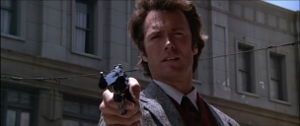
It’s one of the most-quoted films of all time, the basis for entire sub-genres, and the film most directly responsible for giving Clint Eastwood a post-Spaghetti Western career. Yet you’d be hard pressed to find five people in the same place who’ve actually seen Dirty Harry for what it is. I, for example, had never seen it in its entirety until last week. That’s what happens when you spend your childhood watching shitty monster movies (or even good monster movies, for that matter).
I got burnt out, is the thing. Wrestling with Captain America really got to me, but considering what it did to Christopher Lee, I got off easy. So I decided to recharge my batteries by reaching back to a now-officially-classic piece of American film making. It was time to plug one of the more-obvious holes in my personal cinematic education. It was time to start counting shots.
So Dirty Harry, for the increasingly large number of people who might not know, opens with the 1971 equivalent of today’s Islamofascorist: the Lone Gunman. In this case, it’s a rooftop sniper who kills a woman in a pool for…no real reason, apart from the fact that “thrillers” need to start off somehow. And what better way than Murder Most Foul? So the camera leaves our Killer to favor of following the policeman in charge of investigating this senseless crime, San Francisco Inspector “Dirty” Harry Callahan (Clint Eastwood).
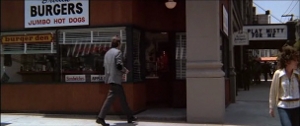
Harry, through the magic of geometry and observation, finds the Killer’s sniper nest and the note the Killer left pinned to a TV antenna, warning that his next targets will either be a Catholic priest or an African American…unless the city pays him one hundred thousand dollars (man must’ve gone to the “start your bidding low” school of terrorist extortion). We get our first true glimpse into Harry’s personality when he mouths off to the mayor instead of providing a progress report like the good little tin soldier the Mayor (John Vernon), the Chief (John Larch), and Harry’s Leiutenant (Harry Guardino) all think he should be. Because Harry is more than a Cop Who Doesn’t Play By the Rules – he’s the Cop Who Doesn’t etc. etc.
You have to ignore a whole hell of a lot of history to see Dirty Harry with fresh eyes, and it’s impossible to recreate the experience of watching this film in 1971. It’s safe to call this one of the most important films of the late 20th century. We can thank this film for Martin Riggs, John McClane, Cobra, and Arnold Schwarzenegger’s career. We can also thank it for a vault’s worth of shitty Italian knock offs and the modern plague of police procedurals. I’d go so far as to say modern Cop Mythology begins Dirty Harry and has since reached its logical conclusion in places like 24 and CSI: Wherever The Hell We Are This Time.
But we can’t fault the film for that. Like Halloween, it proceeded in ignorance of what it would bring down upon us all, a true Lovecraftian protagonist. Because it’s really the story of a smart-mouthed, cynical, misanthropic asshole who’s either the worst cop in the world, or just the unluckiest. I swear, Callahan must’ve arrested an old gypsy woman at some point in the past (“accidentally” breaking her arm in the process) since he can’t even sit down to eat a hot dog without a bank robbery going off across the street.
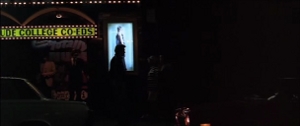
It’s like all those shots in the Felisher Superman cartoons, of Clark Kent looking up from his desk, or tuning into a radio, or stalking out the Daily Planet Building to gawk at the latest giant flying robot. I don’t know about you, but I always imagined Clark’s face looking a bit like Harry’s when he realizes someone’s trying to pull a Dog Day Afternoon on his lunch break. That look doesn’t say, “This looks like a job for Superman,” it says exactly what Harry’s mouth says: “Shit.”
As Harry blew away the bank robbers (leading to his first “…you gotta ask yourself one question,”) I realized this was 1971 – only seven years after the Man With No Name strode into town looking for that Fist Full of Dollars. And I realized Harry Callahan was that man, torn out of time and reborn into a modern world too chaotic and random for his old-school sense of “justice.” This world’s very capriciousness is an insult to Harry’s beliefs in the underlying moral order of the universe. So he imposes what order he can with his hand cannon and his badge. Thus we see the Cop Who etc. etc. as a modern-day, revisionist Western anti-hero, with sunglasses replacing his cool hat and those ugly-ass tweed suits acting as his modern serape…but that’s the same man underneath. And there’s the film’s real gag.
But first, let’s talk about its smaller gags – like how Dirty Harry fools you into thinking this’ll be an all-singing, all-dancing, all-shootouts rampage-a-thon with that gratuitous bank robbery. Instead, what develops is a rather nice slice-of-life police procedural, centered around apparently the only guy the SFPD calls for “any dirty job” that needs doin’. Like catching serial snipers, breaking up Convenient Bank Robberies, or escorting suicidal jumpers down off of their ledges with the strategic deployment of a fist to the face.
When the fire department first asks Harry to climb in the bucket, notice the look on Harry’s partner, Inspector Gonzalez’s, face. Gonzalez’s sheer disbelief that anyone in their right fucking mind would send Harry Motherfucking Callahan to talk down a suicide is equaled only by my own.
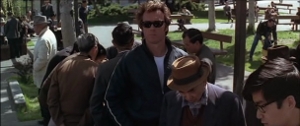
Really, though, Harry’s the messiah, suffering and dying for the sins of mankind. Like any good martyr, Harry wages a daily war against the rotting excesses of a corrupt and callous society ruled over by bureaucrats who’ve grown deaf to the suffering of their people. Why else would so many weird, Christian motifs appear throughout, especially whenever Harry and The Killer square off? Staking-out San Fran’s rooftops, Harry takes up position right under a gigantic, neon “Jesus Saves.” Forced to deliver the Killer’s ransom money by a mayor who must hate his job as much as we’re meant to hate him, Harry and the Killer eventually meet under a the gaze of a giant stone cross…which the Killer makes Harry face – practically kiss. Eventually (and amazingly, by modern standards) the Killer kicks Harry’s ass, reducing him to a bloody mess at the foot of that cross before Harry gets The Killer back with a knife to the knee cap. Because that’s how this Savior rolls. “Jesus” is the first word out of Harry’s mouth and one of the last words out of the Killer’s. It’s enough to drive a guy insane. Hence the first lines in the theatrical trailer:
“This is about a movie about a couple of killers – Harry Callahan and a homicidal maniac. The one with the badge is Harry.”
So let’s turn to the homicidal maniac, played by Andrew “Andy” “Garak” Robinson in – I shit you not – his feature film debut, officially qualifying Robinson for my list of People Who Should be More Famous than They Are. Robinson’s Killer – who signs his letters “Scorpio” – is the most-influential movie monster of his generation. In Scorpio we see every bullshit, one-note Killer in every crappy Cop Drama from here to eternity, so help us God and Harry, amen.
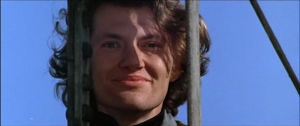
I’m amazed “Andy” manages to make Scorpio such an engaging antagonist. It’s a testament to his ACTING skill since the script gives him absolutely nothing to work with. No back story. No characterization beyond standard Movie Insanity. Barely any dialogue, either, apart from the occasional violation of the First Commandment. Yet Scorpio’ scenes are textbook cases of characterization through expression and testaments to Don Siegel’s powers of directing. Robinson has such big expressions and Siegel selected so many good ones that I ended up “liking” Scorpio more than any of his subsequent imitators. (In so much as one can “like” the bigoted, psycho-killer antagonist of a standard Cop Drama.) I even like the way they dress his sets. Little fucking bastard would be a Raiders fan, wouldn’t he?
So why’s this film so famous? Or infamous to some? Well, both Pauline Kael and Roger Ebert called it “fascist” when it first came out, so there’s that. In order to understand why, I’d have to spoil it for you…if forty years of rip-offs hadn’t already done that.
The first hour of the film is everything I want in a Cop Drama. It’s got a taciturn, badass protagonist who’s put upon without being melodramatic or overemotional. It’s got a crazy villain played by one of my favorite actors. It smoothly and organically ratchets up the tensions and increases its complexity as Harry and the other cops react to Scorpio’s increasingly erratic desperation. Someone should strap Jerry Bruckheimer, Steven Bochco, and Shawn Ryan into Clockwork Orange rigs and force them to watch this film until its divinely-constructed principals are burned straight into their brains.
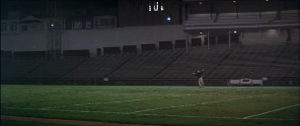
Then Dirty Harry falls apart once Harry tracks Scorpio to his lair – the groundskeeper’s quarters of a stadium I don’t recognize because…well, fuck your sports, is why. Harry climbs over the fence and Scorpio flees as best he can with one functional knee. Harry pursues and the two wind up squaring off in the middle of a football field – the modern age equivalent of old Rome’s Circus Maximus, site of many a martyrdom. Harry wings Scorpio with his hand cannon and approaches the Killer with menace in his voice…because he’s Clint Eastwood, damnit, and that’s just how he talks. The camera pans back from this tableau as Scorpio screams about his “rights”…as if the film itself cannot stand to face what Harry’s about to do.
This is such a logical place to end the narrative I had to pinch myself when the movie, against all common sense, continued. Then I realized the last 40 years of Cop Dramas had not, in fact, been in vain. Believe it or not, the genre has actually moved forward. These days, no Cop worth his inability to Play By the Rules would dare confront the Killer before end of Act Two.
Here, Scorpio’s initial capture is the end of Act Two. Act Three opens with Harry meeting the D.A. (Josef Sommer) and a circuit court judge (William Paterson) who both concur that Scorpio must be set free. Evidence gained through Harry’s search would be inadmissible in court since Harry didn’t have a warrant to break and enter into Scorpio’s “home” and Harry violated at least five amendments in the course of making his arrest. The D.A.’s not about to waste two hundred grand on a trial he can’t win so, sorry Harry, but that man has his “rights.”
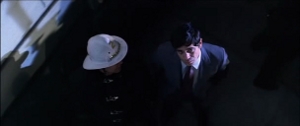
Except this is bullshit of the highest order! A needless plot contrivance meant to pad the film out to feature length. An unforgivable sin that keeps me from becoming the kind of ra-ra-sis-boom-ba, Clint Eastwood/Dirty Harry fan I probably sounded like a few paragraphs ago. It’s as if two scripts, both about two thirds of the way completed, were horrifically sown together by some mad scientist out to make some kind of…I don’t know, movie centipede.
Even if the sniper rifle Harry found and the Killer Shrine on Scorpio’s wall are inadmissible, Scorpio just beat Harry down in a public park under a giant fucking cross not ten minutes of movie ago. Harry’s partner, Gonzalez, is your witness. Scorpio proceeded to shoot Gonzalez, seriously wounding him, to the point where Gonzalez uses that as his excuse to quite the force. Scorpio would’ve probably killed him outright had Harry not introduced the Killer to Mr. Stabby-Stab. Come to think of it, that knife that would be covered in Scorpio’s blood and match the wounds on his leg exactly. Add the testimony of that hole-in-the-wall doctor who treated Scorpio’s wound (and recognized him on sight, and led Harry to his hideaout) and boom. That’s at least enough to get a grand jury indictment. Go to trial and you could easily get twenty-five-to-life with that in the hands of a good ADA. Fuck me, Scorpio up and left you a note in the first scene! You can’t get one good handwriting sample out of this joker before he gets out?
No, because the film is purposefully dumbing itself down in order to bludgeon the audience with its Message For Our Time. One Harry helpfully spells out for us and all the mouth-breathers in audience. “What about that little girl?” The little girl Scorpio kidnaps once the police drive him off of The City’s rooftops. “What about her rights?” Yes, indeed. It’s the kind of Message Bludgeoning that leaves permanent marks and lowers the collective I.Q. of entire nations. The Law – created as it was by the very same, mealy-mouthed beurocrats who are now constrained from doing The Right Thing by their creations – has failed Victims in an effort to protect Criminals. “Then the Law’s wrong,” Harry says, appealing instead to a Higher Authority.
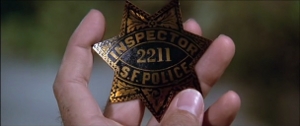
That’s why both Pauline Kael and Roger Ebert mistook this film for fascist propaganda. And honestly, if you tilt your head a bit, it kinda is. Who says the Higher Authority Harry appeals too is some just, benevolent God? Does that kind of God rule Harry’s universe (never mind ours for the moment)? Harry’s Higher Authority could just as easily be “the safety and security of America.” Replace “America” with “Germany” and you’ve got Heinrick Himmler on the stand at Nuremberg, telling his prosecutor that, while every horrible thing the Third Reich ever did might be considered illegal in a democracy, they were all necessary at the time and under the Reich. To protect Germany, you see. Not its people, be they victims or criminals, since such distinctions don’t really matter to actual fascists. No, when they spoke of nations they spoke of a greater body politic that transcended Enlightenment notions about the “rights” of the “individual.” In truly fascist regimes, the “individual” and hish “rights” are not even conceptualized. They becoming meaningless concepts, allowing every harsh, extra-legal action to be justified in the name of protecting…whatever it is you’re protecting. And the first thing all fascists do these days is stand up and boldly procliam, “I’m not fascist! Those whinny, pansy-ass liberals over there, they’re the fascists! We need to burn down their houses and force them into camps before their lovey-dovey talk of ‘freedom’ and ‘rights’ opens the door for a takeover by foreigners!”
So what, exactly, is “Dirty” Harry Callahan protecting here? His wife is dead (of course), killed by a drunk driver last year. “No reason for it.” Harry doesn’t even really know why he does what he does himself. He’s obviously ill-suited for anything else besides hurting people. Almost as if he were specifically designed to hurt criminals. As if he were as much of a one-note cypher as his antagonist; an empty, protagonist-shaped box into which the audience can put whatever they like.
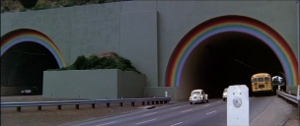
Yet the film is always, always, going out of its way to Designated Harry as the Hero. You feel for the poor bastard right from the start. Bad enough his superiors force him to deliver cash to a mad man. Bad enough the mad man runs him all over town in an attempt to evade surveillance. With all that on his shoulders, Harry still has to face off against gangs of toughs, drunk homeless dudes, and propositions from suicidal twinks. It’s as if San Francisco itself is attacking, rising up to aid Scorpio in his completely-unexplored ends. And if we have any doubts as to the real cause of Scorpio’s madness we need only listen to Harry’s dialogue as he and Gonzalez drive around the Tenderloin.
Harry: These loonies there; I’d throw a net over the whole bunch of ’em.
Gonzalez: I know what you mean.
I do too, Harry:
When they go, I will throw my net over them; I will pull them down like birds of the air. When I hear them flocking together, I will catch them. Woe to them, because they have strayed from me! Destruction to them, because they have rebelled against me! I long to redeem them but they speak lies against me. (Hosea 7:12-13)
Yet, despite all this, Harry never once displays the true blue fascist’s hatred of The Other. He’s got a glare, snarl, and cutting remark for everybody. So much so that his colleagues praise him for his Equal Opportunity Hatred of all creeds, colors and coital choices. Harry Callahan, in the parlance of our modern rap stars, just don’t give a fuck.
So we see Harry’s Higher Authority is, at the end, neither God nor the State. Harry’s a nihilist, pure and simple. The daily horrors of his job and the absence of any counterbalance has left him a hollow shell, more of a Ghost Who Walks than any of the twenty-one Phantoms known to recorded history.
And since none of the crap Harry goes through is necessarily his fault I can’t even call him a tragic hero. The film just throws roadblocks in his way for our amusement. That’s the real reason why the political structure of this universe’s San Francisco is powered by Pure, Grade-A Stupid. Jesus Christ, if the Mayor wants to give into a crazy person’s demands that’s fine. (Well, it’s not – it’s totally unbelievable, but whatever.) But what Mayor in the multiverse would be stupid enough to promise that crazy person “he would not be molested”…and then send Harry Motherfucking Callahan out to the meet-up? That’s a whole new level of Stupid we would not see again until Mayor Vaughn refused to close his town’s beaches.
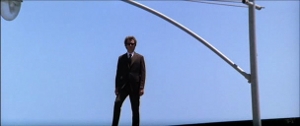
I think Dirty Harry could stake a good claim to being the Ultimate Nihilist’s Film. No less a luminary than Robert Michum (who turned the part of Harry down) called it one of those “movies that piss on the world,” and who are you to argue with a man who stormed Normandy in 1962’s The Longest Day? That being the case, I can’t help but like Dirty Harry. Even if the whole Third Act is a tacked on exercise in padding and Blunt Force Message Trauma. This is the American Action Movie’s Citizen Kane, an enduring inspiration, and a monument to good filmmaking. Too bad about all those sequels, homages and rip-offs. They’ve only diluted this flick’s inherent impact.
But there’s a very good reason Dirty Harry‘s been so inspirational. The film is, at its core, quite the deft character study. By injecting the Western Anti-Hero into a modern setting it allowing America’s silent “majority” to believe cops were still the virtuous agents of God and His eternal (Law &) Order they all want their cops to be…despite what the Supreme Court, or the social activists of the time, might’ve said, having learned from many a varied and painful experience.
![]()
![]()
![]()
![]()

Yes – and then Richard Nixon had his secret plan to end the war, and a return to law and order, and was elected. Nihilism was the only salvation for the sane. We could feel it – there was a bad move on the right. See it now.
Yes, it’s the same move they’re making now. They never really stopped and only drew inspiration from Nixon’s eventual downfall – the first time they turned “Never Again” into a cultural meme. Only that time they meant, “Never again will our leaders be held up to any kind of meaningful scrutiny whatsoever.” Suddenly, being a “Conservative” stopped being about “conserving” the culture, laws and ruling institutions of the United States and became all about waking up hating them first thing every morning, decrying them as “corrupted” by insidious lefties with all their mealy-mouthed talk about “rights,” and fighting for their ultimate destruction. Calls for a government so small “you could drown it in a bathtub” are calls for a return to Bronze Age barbarism, where nothing stands between nihilistic assholes and their great power to do harm to everyone around them. As we see today.
You’d think that would be a detriment to an actor trying to get something out of a role but that’s a gold mine. The problem with a lot film today is people TALK to damn much. They have to mention where they came from, who they are, and what their motivations are. The less I know about Nurse Ratchet, Tommy Udo, Norman Bates, and Hannibal Lecter the better. Villains, no matter what medium, should feel like they have no origin, no place in society, and ultimately just some anomaly that makes you ask “why?” However that is not to say finding out more about a villain would make him or her less interesting. For example, Hannibal (the book not the movie), was a very intimate portrait of Dr. Lecter but his remarkable discipline and animal instincts were kept well enough in mystery. Not to digress too much, I’ll get back to the film.
I am a huge fan of Dirty H and you are right, it IS the precursor to every cop film in the 1980’s. Well…I should say Coogan’s Bluff but nobody gives a shit about that movie. 😛 I do agree with you about that last act but IMO, I thought it was necessary because it was suppose to be the breaking point. A bus load of kids for goodness sake ! And I can barely watch that scene when Scorpio slaps that kid. When I see ole Harry Callahan standing on that raised highway I am not saying “How the hell did he know when and where the bus was coming ?”, I am saying “Get that fucker Harry !”
This country has just become so divided, it’s beyond repair. The only answer is destruction and reconstruction. Societies have ultimately only progressed through violence.
I knew I could find at least one honest-to-God fan of this film out there.
When it comes to certain actors, I totally agree. Thank God “Andy’s” one of ’em. Michael Ironside is another; particularly his younger selves.
I get that the film “needs” its bus load of kids to set up the Climactic Action Sequence…but since I’m a misanthropic bastard who’s unconsciously spent his whole life slowly mutating into Harry Callahan, I’m significantly less involved in the fate of those kids, Harry, or Scorpio. I just loved the end of Act Two so much I think anything would’ve felt tacked-on and excessive.
Oh yes, it does depend on the actor. Christopher Walken has that ability as well because he has such a strong personality.
Getting back to the film, I guess it depends on what strikes your nerve. I can watch people get blown to bits. However when I see kids smacked around, I cringe. Of course, it has to be well done.
As for the sequels, I did enjoy Magnum Force. The story was very cleverly written and the violence was very well done. I also liked the fact the film basically denounced the notion of Harry being some nutty vigilante. I know, the end sort of contradicts that message but hey, it’s Dirty Harry. The bad guy ain’t gunna get arrested at the end.
The Enforcers was just okay. Very dated in it’s themes and the villians were rather sterotypical. Nothing too bad but nothing too great. One of the biggest strikes against it is no Lalo Schifrin score.
Sudden Impact is one that I also enjoy a lot because the way the film was constructed and shot like a latter day film noir. I also like the fact that the villians in the film have no social or political ties, they are regular, nasty people. And what else do I need to say besides “Go Ahead. Make my Day.” ?
As for The Dead Pool…
I sure loved Dirty Harry. Don’t you ?
“Of course, it has to be well done,” should be the invisible corollary to every absolutist critical statement ever made. And the “force of personality” factor does go a long way to explain the strange power of certain actors to add the illusion of dimension to their roles.
As for the sequels…well, I have to do something once I run out of Batman movies, don’t I?
A strong personality can be a blessing and a curse. Christopher Walken is a great actor but he can’t help but be Walken. The same can be said for Peter Lorre. However there is that rare actor who has a tremendous personality but can loose them selves in different roles; Marlon Brando is definetly the epitome of such an actor.
So you haven’t seen the sequels ? Well enjoy.
I figured, if AYTIWS is going to branch out into the Action genre, I might as well start at it’s beginnings. Also, I just finished reading up on the Manson case for another project, and it’s got me thinking about the ’70s in a bad way.
The closest thing to a backstory given to Scorpio is that he wears parachutist’s boots, which suggest that he went over the edge because of his experiences in Viet Nam.
Bless your sharp eyes, sandra. You win the Gwaihir Award for highlighting the power of costume designers to flesh out flat characters in visual fiction. I’ve read interviews where Robinson state he used that to create his own Scorpio back story – a young man, scarred by the horrors of war, tortured by the disrespect he encountered back home, killing representatives of the emerging culture Harry despises even as he fights to preserve it. He’s basically a reedier John Rambo, with more elaborate plans…even if he seems to have stolen them from Republic Serial Villains.
In novelization, Scorpio’s real name is Charles Davis.
Reminds me of another famous, psychopathic Californian who masqueraded as a hippie until he went on a killing spree, named Charles…for some reason, his last name escapes me at the moment. But I remember he was found guilty on March 29, 1971, almost nine months to the day before this film premiered…which is actually kinda creepy now that I stop to think about it. Time to wash my brain out with more Saturday morning cartoons.
Your review prompted me to look Andrew Robinson in the IMDB.
Garak on Deep Space Nine? Awesome!
I know, right? I was like, “Holy shit, the Obsidian Order got its hands on a time machine! Now they’re out to win the Dominion War by destroying the Federation’s past! Somebody get The Sisko on this!”
I was just watching the Sidney Lumet’s The Offence last night and I can’t help but think that THAT was how DH should have ended. If you want to see it, it’s in 8 parts on Youtube. Powerful stuff.
Awesome – I’ll definitely check it out. Thanks, man.